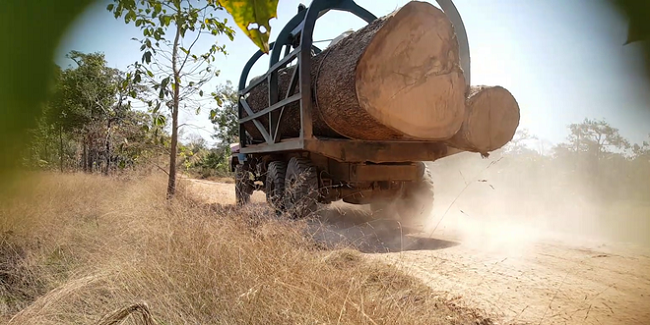A looming trade agreement on tropical timber involving the European Union and Vietnam is being resisted by a civil society group, which insists that the Southeast Asian country must first clean up its act.

Though Vietnam has banned logging in its own forests, Vietnamese loggers are allegedly crossing the border and plundering national parks in Cambodia.
Amid reported growing opposition to the deal among members of the European Parliament, the EU International Trade Committee will on Tuesday, February 19, 2019 debate the agreement, and the European Parliament will be voting on it in March.
The campaigners insist that the EU must not conclude a trade agreement with Vietnam if Vietnamese traffickers are laundering illegal timber from Cambodia.
“The EU is working on a trade deal that would effectively let Vietnam launder the timber it has been stealing from Cambodia and export it to Europe unhindered,” says Reinhard Behrend of the Rainforest Rescue, a not-for-profit outfit.
“We want EU policymakers to know that countless Europeans don’t want timber from Vietnam and Cambodia,” he adds.
The EU is one of the largest markets for tropical timber and wood products. It has been estimated that more than half of that timber has been felled illegally.
In 2003, the EU drew up the Forest Law Enforcement, Governance and Trade (FLEGT) Action Plan. A part of FLEGT is the EU Timber Regulation. Voluntary Partnership Agreements (VPA), which are concluded between individual countries and the EU, are a central pillar of FLEGT.
VPAs essentially stipulate that source countries guarantee that the timber they export has been legally sourced. The EU, in turn, eliminates import inspections.
This requires source countries to revise their forest laws, put monitoring in place, strengthen forest management and fight corruption. The VPA negotiations include representatives of NGOs and local communities.
The EU is currently negotiating with numerous countries. Negotiations with nine countries are still in early stages, while talks with Ghana, Liberia, Cameroon, the Central African Republic and the Republic of Congo have progressed rather far. At present, Indonesia is the only country to issue FLEGT licenses.
But, according to environmentalists, the FLEGT Action Plan and VPAs have serious flaws.
“’Legal’ timber is not necessarily legitimate. Legal logging is often devastating for rainforests and violates the rights of indigenous people. Many experts do not consider logging in the tropics to be sustainable in any form, and therefore advocate a ban on tropical timber imports.
“The exporting nations see the trade agreements as a means to sell more timber and wood products to the EU, thus increasing pressure on their forests. A thriving market can also create incentives for criminals.
“FLEGT and VPAs govern trade only with the EU, not with third countries. While many countries, including the US, Canada, Australia and China, are taking action against illegal logging and timber trafficking, criminals are still finding plenty of wiggle room,” states Behrend. The Rainforest Rescue has meanwhile taken up a campaign against an EU seal for timber trade with Vietnam.
